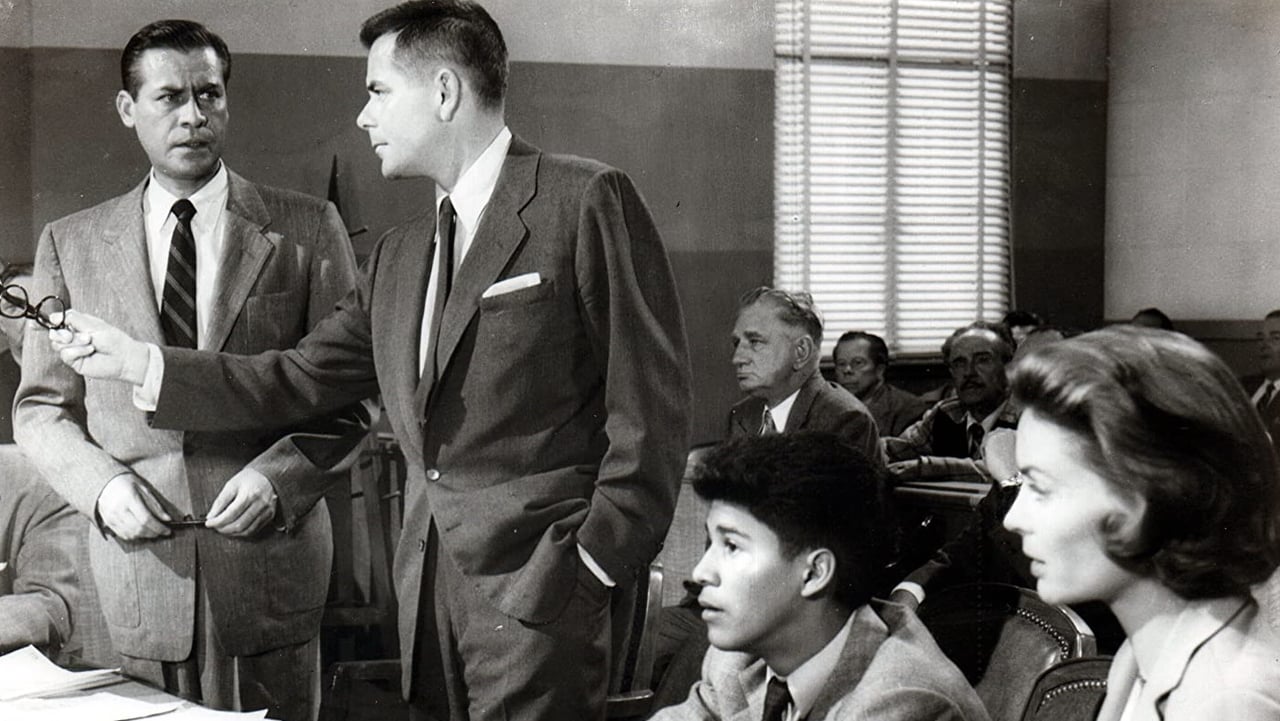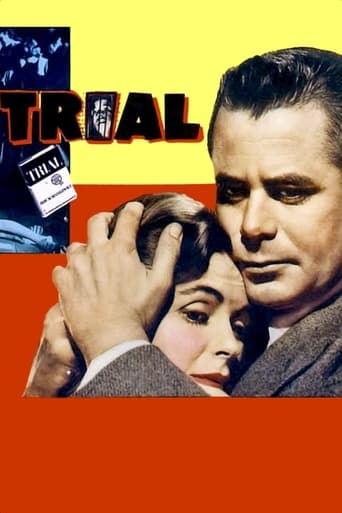



Some things I liked some I did not.
Self-important, over-dramatic, uninspired.
Boring, over-political, tech fuzed mess
This movie was so-so. It had it's moments, but wasn't the greatest.
View MoreThis very unsatisfying movie is really all over the place, just like the era that produced it. In that sense, it's an interesting document of its time, but not too fun to watch. It starts out as a typical corporate-liberal morality courtroom-crime movie, a' la Call Northside 777 or 12 Angry Men. But those movies were unequivocal about their direction -- they knew where they wanted to go and went right there. This one quickly loses its thread as it veers off course into 1950s anti-Communist paranoia-land. This movie isn't satisfied pointing out the dangers of the Communist 5th column that supposedly wanted to tear down our society and values. It doesn't even have faith in its own anti-Communism, posing the idea that 1950s ultra-leftism was bad because it was some kind moneymaking con. The plot about the far right ideologues who want to lynch the boy at the film's outset is forgotten about a third of the way through. The usually terrific Glenn Ford looks lost here -- his notion of moral confusion seems to be wandering around as if he has forgotten his lines. Maybe he's trying to figure out where the plot will go next? The film's final bizarre resolution is unrealistic, to say the least. We're supposed to be happy that the Mexican boy is only sentenced to a juvenile reform school instead of the electric chair. But the problem is -- is the boy a murderer or isn't he? If he's not (as the film seems to imply), why is it fair that he is punished at all? This is the American consensus view at its most confused. The final scene where the prosecutor stands up and agrees with the lenient sentence is the prize topper to this unlikely and directionless trial. This isn't the most far-fetched law movie -- I can't decide whether that honor belongs to the stupid "Suspect" starring Cher or the well-made "Boomerang!" with Dana Andrews. But it's certainly the most confusing -- guaranteed to appeal to the modern nativist right wing, who will probably think it's okay that a Mexican boy be sent to reform school for daring to set foot on an all-white beach or sit next to a white girl. (That'll teach 'em.) I should also mention the headache-inducing "edgy" bebop piano score, which seems to have been a staple of this type of movie in the 50s. It does have a few laughs, though these are unintentional. For example, listen to Dorothy McGuire's little soliloquy about how she turned Communist sympathizer during college -- she just wanted to be special! Weird, weird weird.
View MoreThis film fascinates precisely BECAUSE of its confused treatment of the theme of bigotry. It does not only refer, under a thin disguise of name, to Senator McCarthy - but also to the Ku Klux Klan. To me, its chief value is that it illustrates rather startlingly the ethical strangeness of a mid-fifties America apparently seeking a definition of justice while still beset with considerable self-doubt concerning its own institutions.Few films of the period make so explicit the names of the antagonists; that is what sets it apart.On the level of pure melodrama, it is entertaining, fast-paced and convincingly acted. The opening scene suggests an erotically-charged no man's land, namely the beach community of San Juno, anno 1947. This is the scene that I think will remain in my memory, because it precedes all the rhetoric, legalistic and otherwise, which never quite connects with the reality of spontaneous behaviour - simply, groping in the dark.
View MoreA 50's movie which challenges extremism at many levels. Bigotry, police corruption, mob mentality and communist subversion all are taken to task in this movie. A young Hispanic boy is accused of murdering a young white girl. Glen Ford, a law academic with no practical experience takes the case to learn what it is like to handle a real case rather than one from a text book. He is an incredible teacher, but will he be as good in the real world.Throughout the story see then towns people wanting to hang the boy, the subversion of a communist sympathizer who uses the young man and his mother to further his cause, corrupt police, real-estate hungry bigots and more.Truth win out in the end. However, Fords character is challenged by the trial judge, brilliantly played by Juana Hernandez, and his own bigotry (Sydney Portier does the same to Ford in "The Blackboard Jungle".Over all a good movie set in the cold war era. It is a film where consensus is fought for and truth prevails.
View MoreThis movie just seems to take on too much and it just doesn't work. It stars out with Glenn Ford working as a law professor who is about to be fired unless he gets some actual trial experience. He goes to several different lawyers but is turned down until he runs into Arthur Kennedy. Dorothy McGuire is his assistant and begins a relationship with Ford. They get a young Mexican boy accused of murdering a white girl as a client and Ford and Kennedy seem to be going in different directions on the case. Ford actually wants to save the boy but Kennedy just wants to raise money and make a martyr out of him but he can't do that unless the boy is found guilty. They even bring up communism in here and it just seems they bring up too much in not enough time.
View More